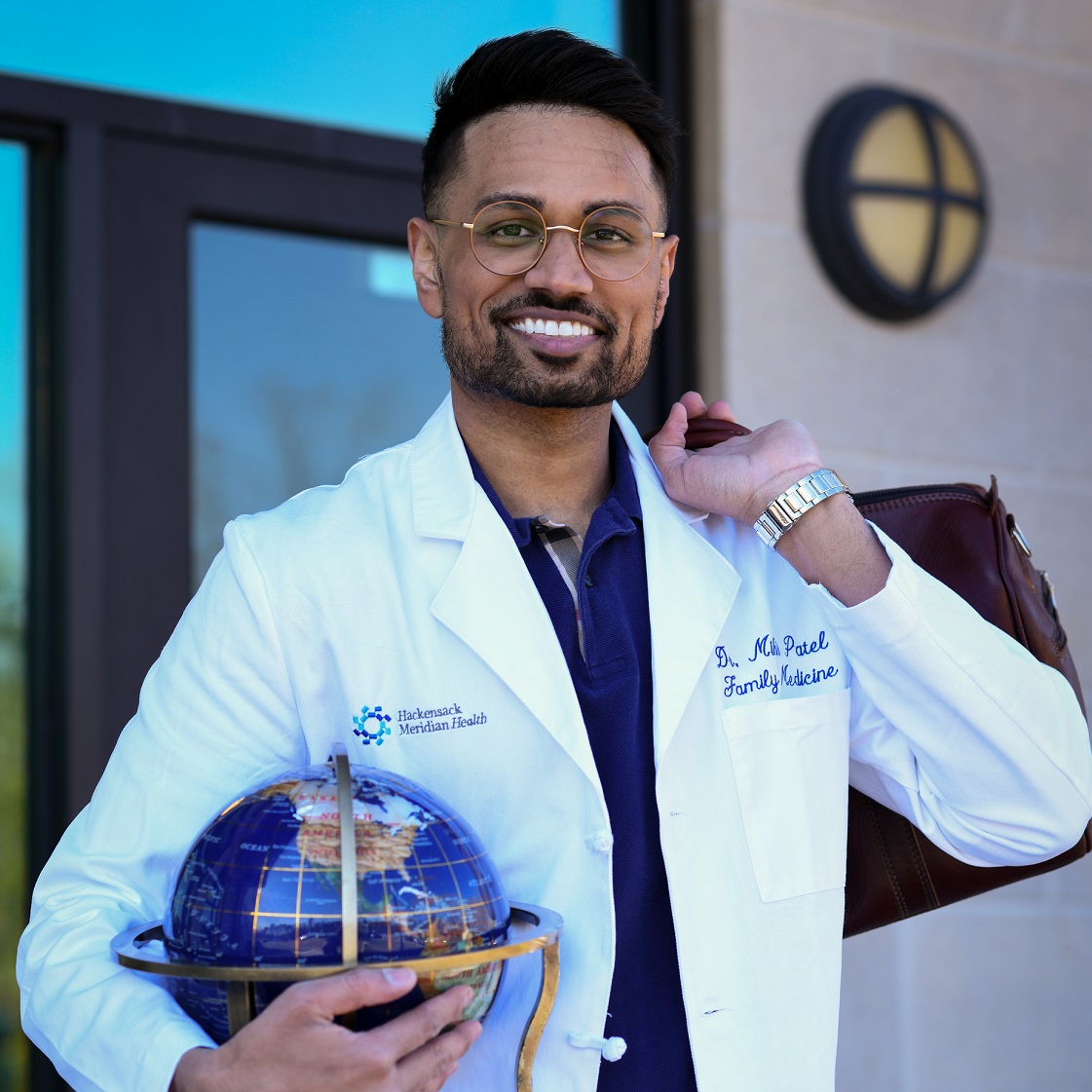NJ Thoracic Surgeon Stays Active Through Japanese Martial Art

October 13, 2022
When he’s not working, Dennis Vega, M.D., is on the move. He enjoys biking, walking and golfing whenever he can.
“I like to do outdoor activities,” says Dr. Vega, a thoracic surgeon with the Hackensack Meridian Health Medical Group. He also enjoys a Japanese martial art called Aikido. He stopped during the height of the COVID-19 pandemic, but he hopes to get back to it soon, since he is just two levels down from a black belt.
When he isn’t being active, he spends time with his two sons or in the kitchen cooking a variety of foods—including a special dessert. “It’s a devil’s chocolate cake with flan on top. It’s my specialty,” he says.
Why did you decide to become a doctor?
I was originally a chemistry major in college, and I started working in a laboratory when I was an undergrad. Although I enjoyed the work, I soon realized there were no people in the lab, so I didn’t like being there all alone. I figured I could still do lab work but be with people if I went to medical school, so I decided to pursue this path.
What led you to thoracic surgery specifically?
When I first entered medical school, I thought I would go into pediatrics because I was always good with children, but my first professor was a surgeon who taught embryology. I signed up for electives with him, and that’s what led me to surgery. As a surgical resident, I was exposed to thoracic surgery on multiple rotations and really liked the complexity of work, so that’s why I chose to pursue it.
What has been your most memorable or rewarding experience as a thoracic surgeon, and why?
There was a patient that had a needle biopsy of a right lung mass. After the biopsy, he bled into his airway, and I was called. I mainly discussed things with the patient's son. I took the patient to the operating room and cleared the blood from the patient's airways. Unfortunately, the patient's airways filled up again with blood. I explained to the son that I would have to remove the lobe that contained the mass. I did the operation, and the patient did well. However, I was scheduled to be off the following week, and when I returned, the patient was already discharged to rehab.
One day during office hours, I had a patient return, and I didn't quite remember the name. I opened the door and called the patient to the room. I then saw the son of the patient I operated on, and I remembered. Before I could complete my hello, I was met by a huge bear hug by the father, and he thanked me for saving his life.
What interested you in Aikido, and what are some of the benefits of practicing a defensive martial art?
I got into Aikido toward the end of college. A friend of mine was doing it. He invited me to the dojo, and I liked it. It was a martial art that you could do every day because it didn’t involve the brutal blocking of kicks and punches. All of it is based on manipulating the body and energy to throw or pin your opponent. It’s meant to stop your opponent as quickly as possible.
I liked the fact that it was based on Japanese sword techniques, as well, so everything you do with your hands, you would do the same thing with the sword. You also learn to defend yourself against the sword, knife and staff. Since everything is defensive, it is a martial art where you learn to defend yourself against multiple attackers earlier. I like that and the movement it involves.
What is the best gift you have ever received, and why?
There are two that come to mind. The first was a 1988 Honda Accord. I was completing my post-baccalaureate at The Ohio State University, and I worked in a lab with a Japanese doctor. He had completed his work and was returning home to Japan. He asked if I would be staying in Ohio and I said, “So far, yes.” He then said I will give you my car with one condition. You must drive me to the airport. At the airport he signed the car over to me.
The second happened after I performed a robotic repair of a recurrent diaphragmatic on a patient. He was very nervous, and I took the time to explain all the steps involved and how I would return his abdominal contents back into his abdomen, through his chest. The operation went very well. The patient was appreciative of the work I did, but also the time I took to explain everything to him. I later received a certificate from Hackensack Meridian Health, which stated that the patient donated money to network on my behalf.
Next Steps & Resources:
Meet our source: Dennis Vega, M.D.
To make an appointment with Dr. Vega or a thoracic surgeon near you, call 800-822-8905 or visit our website.
The material provided through HealthU is intended to be used as general information only and should not replace the advice of your physician. Always consult your physician for individual care.

Doctor Spotlight - Michelle Lomotan, M.D.
Meet Michelle Lomotan, M.D., an internal medicine doctor who’s passionate about health, wellness and board games.

Former Football Player Now Tackles Family Medicine
Patrick Correa, D.O., played football in college. Today, he remains active and passes that knowledge to his patients.

Doctor Spotlight - Meha Halari, M.D.
Get to know Meha Halari, M.D., a family medicine specialist who loves her home state of New Jersey, music and multi-generational living.

Family Doctor Enjoys Serving the Community that Shaped Him
Get to know Mihir Patel, M.D., a family medicine physician at Jackson Family Medicine and Ocean University Medical Center.


